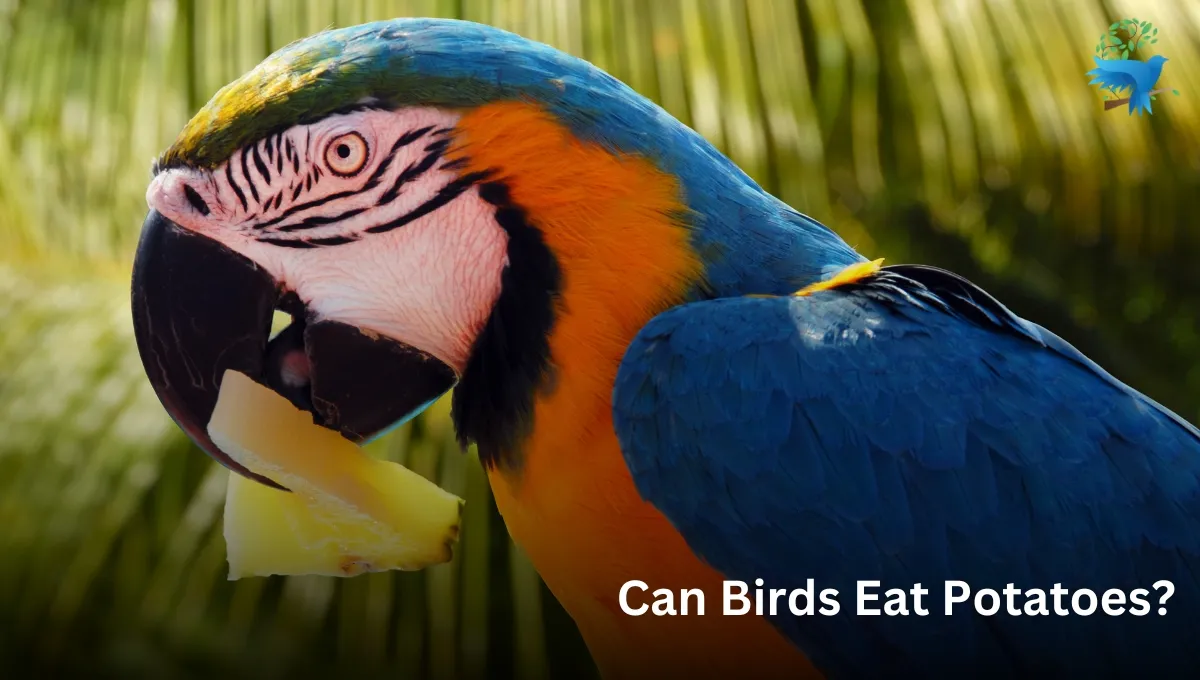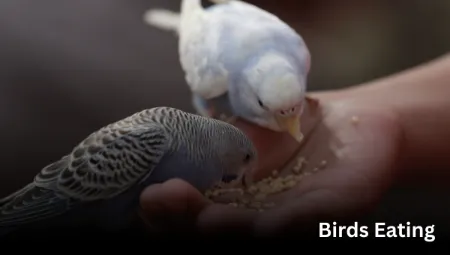Can Birds Eat Potatoes?

Bird feeding is a favorite pastime for many who like attracting and caring for birds. While birds eat various foods, including insects, seeds, fruit, and small animals, it is critical to know which foods suit them. One frequently asked question concerns the safety of feeding potatoes to birds.
Can Birds Eat Potatoes?
When raw or green, potatoes contain solanine, a poisonous chemical detrimental to birds, as a result, it’s best to avoid feeding raw potatoes to your feathered pals. Choose bird-friendly options such as seeds, nuts, fruits, and specially prepared bird feed instead.

Providing a safe and varied meal for our avian companions contributes to their well-being, making bird feeding a pleasurable and responsible hobby for lovers. In this article, we’ll look at birds’ dietary preferences, the risks of providing them with potatoes, safe alternatives, and practical recommendations for responsible bird feeding.
Types of Birds and Their Diets
The varied eating habits of bird species highlight the necessity of recognizing their tastes. While some birds feed on seeds and grains, others eat insects, fruits, nectar, small mammals, and fish.
Pigeons, crows, and seagulls are opportunistic eaters, eating a variety of things, but raptors such as owls and eagles are carnivorous, focusing on small animals or other birds.
Likewise, woodpeckers and swallows eat troublesome insects, waterfowl like geese and ducks eat watery organisms and vegetation, and songbirds like finches and sparrows eat seeds.
Hummingbirds’ beaks are specially designed for nectar ingestion. Recognizing these nutritional differences is critical since certain bird species, particularly those that eat seeds, may not readily accept or benefit from starchy foods like potatoes. Bird feeding procedures tailored to individual dietary needs to ensure our feathered friends’ well-being.
Can Birds Safely Consume Potatoes?
Potatoes are a human nutritional essential, which raises concerns about their suitability for avian ingestion. Birds can take small portions of cooked, plain potatoes without immediate danger when served in moderation and adequately prepared.
However, caution is needed, as potatoes contain poisonous substances, particularly solanine, abundant in the tuber’s green sections and sprouts. This toxin may endanger the health of birds by causing various adverse effects. Despite their potential toxicity in some forms, potatoes can be a safe and helpful nutritional additive for birds if prepared correctly.
Providing potatoes in appropriate volumes and ensuring that they are clear of green patches or sprouts aids in providing birds with a beneficial energy source while reducing potential health problems.
Risks of Feeding Potatoes to Birds:
Feeding potatoes to birds carries significant hazards due to the presence of solanine, a natural defense mechanism that can cause serious health problems and even death.
Green or sprouting potatoes have lethal levels of this toxin, even in small amounts, making it critical to avoid feeding such pieces to birds.
Read More: How Long Do Hummingbirds Live Without Food? >>>
While a small amount of raw potato is not dangerous, higher amounts can lead to nutrient shortages because raw potatoes contain enzymes that inhibit the absorption of nutrients from other natural foods found in wild bird diets.
It is critical to avoid giving raw green potatoes or potato skins to birds since the green portions indicate that the potato is preparing to sprout into a new plant, resulting in heightened toxin levels that can make the birds ill. To guarantee the safety of their feathered visitors, responsible bird enthusiasts should prioritize providing safe alternatives.
Bird Food Alternatives to Potatoes:
When feeding birds, choosing bird-friendly meals is an innovative and safer strategy. Choosing nutritious alternatives such as bird seeds and fresh fruits such as apples, berries, melons, leafy greens, and mealworms ensures that birds have a well-rounded diet without exposing them to the toxins in potatoes.
These solutions provide essential nutrition while catering to numerous bird species’ unique dietary needs. Bird seeds are high in energy, whereas fruits are high in vitamins and antioxidants.
Leafy greens provide critical minerals, while mealworms are a protein-rich choice that insectivorous birds prefer.
Practical Tips for Feeding Birds:
To ensure the well-being of birds during feeding:
Avoid Feeding Raw Potatoes
Avoid feeding birds raw potatoes or other green components since they may contain poisonous substances such as solanine.
Cooked Potatoes in Small Portions
If you feed cooked potatoes, ensure they are plain and clear of green patches or sprouts. To reduce potential dangers, serve minimal servings.
Bird-Friendly Environments
Enhance the general well-being of avian visitors by providing clean water supplies, appropriate feeding stations, and natural shelters.
Clean Water Supply
Ensure a regular supply of clean water for drinking and bathing, as hydration is critical for bird health.
Shelter Availability
Create a safe environment for birds by including natural shelters such as trees or birdhouses where they can seek refuge from predators or adverse weather.
Proper Feeding Stations
Establish well-designed feeding stations that accommodate the diverse dietary needs of birds, keeping different food types organized and easily accessible.
Regular Cleaning
Maintain hygiene in feeding areas by regularly cleaning bird feeders and surrounding spaces to prevent the growth of mold or unsafe bacteria, reducing the risk of diseases among bird populations.
Conclusion
In conclusion, feeding birds involves carefully considering their dietary requirements to ensure their well-being and health. While birds can eat small amounts of cooked, plain potatoes, it is critical to understand that the risks outweigh any potential advantages.
Setting priorities for bird-safe alternatives that supply vital nutrients without introducing potential dangers is part of responsible bird feeding.
Understanding the significance of providing nutritious, toxin-free diets is critical in promoting the general health of our feathered friends. We may contribute to the well-being of birds and maintain a peaceful relationship between people and their feathery friends by following these suggestions and staying aware of any threats.
Reference
Can Birds Eat Potatoes? How To Offer This Root Vegetable
Can Birds Eat Potatoes? Must-Know Facts And Preparation
FAQs
Are potatoes good for birds?
While birds can eat small quantities of cooked, plain potatoes, the risks outweigh the advantages. Feeding them bird-safe alternatives ensures their well-being. To address their dietary demands, prioritize healthful, toxin-free meals.
What food do birds not eat?
Certain foods, such as those heavy in salt, sugar, and processed foods, are often avoided by birds. They may also avoid spicy or seasoned foods. Avocado, caffeine, chocolate and alcohol are all toxic to birds. To preserve their well-being, a diet rich in bird-safe fruits, vegetables, seeds, and grains is essential.
Can birds eat french fries?
Feeding birds French fries is not recommended. While birds may consume small amounts of plain, cooked potatoes, the typical preparation of French fries involves frying in oil and adding salt. The high salt content and unhealthy fats can be harmful to birds. It’s best to offer them natural, unprocessed foods that align with their nutritional needs for optimal health.






